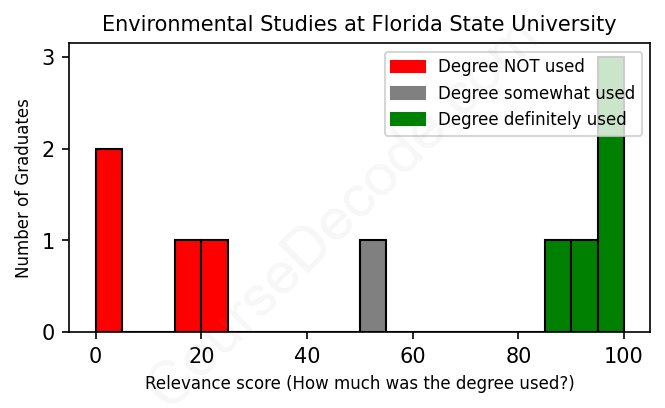
First, some facts. Of the Environmental Studies graduates from Florida State University we've analyzed , here's how many have used (or NOT used) their degree in their career:

These are estimates based on AI analysis of 10 LinkedIn profiles (see below).
The verdict? Below average. Overall, with an average relevance score of 57%, Environmental Studies graduates from Florida State University have a lower likelihood (-10%) of finding work in this field compared to the average graduate across all fields:
And for comparison, here's the chart for all profiles we've looked at across all degrees.
Also, after graduating, 50% of these graduates have pursued further education other than another Bachelor's degree (such as a Masters degree or other), compared to the average across all profiles of 35%. This suggests you may need more than just a Bachelors degree to be competitive as a Environmental Studies graduate.
See the details:
|
Relevance score: 2% We think this person has NOT gone into a career related to their degree. We think this person has NOT gone into a career related to their degree.
DEGREE INFOGraduated in 2013 from Florida State University with a Bachelor of Science (B.S.) in Environmental Studies. Also pursued further education since (see below). JOB HISTORY SINCE GRADUATIONHostess Outback Steakhouse 2013 - Dec 2013 Community Redevelopment Surveyor Intern  City of Pensacola, Office of the Mayor Jan 2014 - May 2014 Medical Assistant & Receptionist  Dr. Syed Gilani, internal medicine May 2014 - Apr 2015 Brand Representative  Abercrombie & Fitch Jul 2016 - Jan 2017 Radiography student  Valencia College May 2016 - May 2018 Radiologic Technologist  Orlando Health Arnold Palmer Hospital Feb 2019 - Aug 2021 Radiologic Technologist  Nemours Nov 2020 - Present Radiology Technologist  Southern Orthopaedics Jul 2023 - Present FURTHER DEGREES DONE SINCE GRADUATINGAssociate of Science (A.S.)Valencia College 2016 - 2018 ABOUTI graduated from Valencia College in 2018 with my associates of science in Radiography, graduated Florida State University in 2013 with my bachelors of science. Have had many experiences with rotations at different hospitals/outpatient centers as well as familiar with GE, Siemens, and Toshiba X-Ray equipment. I am also a certified basic x-ray machine operator. |
The top 10 most common jobs done by the graduates we've analyzed (ranked most common to least) are:
So, when looking at the types of jobs that folks with an Environmental Studies degree from Florida State University have snagged, it's clear there’s quite a mix. A lot of these roles fall into the hospitality sector—think hotel management and guest services. These positions like Guest Services Manager and Assistant General Manager at various hotels show that some grads have taken a completely different route from their studies, focusing instead on customer service and hospitality practices rather than environmental concerns. Similarly, roles like Sales Associate or Bartender have nothing to do with their degree, indicating a common trend where some grads aren't using their Environmental Studies background in their jobs.
On the flip side, there are also graduates who have managed to align their careers with their degree much more closely. For instance, positions like Wilderness Therapy Guide, Environmental Planner, or Environmental Specialist demonstrate a direct connection to environmental issues and sustainability. These jobs actively involve applying the knowledge and skills learned during their studies and contribute positively to the field. While there's a good blend of irrelevant roles and relevant positions, it seems that the connection to Environmental Studies is hit or miss—especially noticeable in those who drift into industries where their degree isn’t particularly applicable. So, whether these graduates have found their niche in the environmental realm or pursued paths outside it varies significantly among them!
Here is a visual representation of the most common words in job titles for Environmental Studies graduates (this is across all Environmental Studies graduates we've analyzed, not just those who went to Florida State University):

When we take a look at the career trajectories of graduates from the Environmental Studies program at Florida State University, it seems like there's a mixed bag. For many of those who graduated around 2010 to 2015, the first jobs post-graduation often leaned more toward hospitality or unrelated fields. For instance, one grad went from being a Guest Services Manager to climbing the ranks within the hotel industry, showing that not all made a direct leap into environmental roles. Others ventured into areas like sales or even medical fields, which aren’t heavily linked to the environmental studies discipline. This trend suggests that while they may start in jobs that pay the bills, it can sometimes take time for grads to find their footing in roles that truly align with their studies.
Fast forward five to ten years later, and you'll see a more significant development towards environmental-related positions. Graduates who initially took on roles in different sectors eventually transitioned to jobs in environmental planning, ecological management, and policy-related roles. For example, some have found promising positions as environmental specialists and planners, or have taken on roles within the government or non-profits that deal with sustainable development and ecology. While it may take a few years to pivot towards their passion for the environment, those who graduated more recently seem to be steering their careers toward meaningful positions in sustainability and environmental planning, marking a hopeful trend for future graduates.
Honestly, a Bachelor’s degree in Environmental Studies at Florida State University, or really anywhere, is pretty manageable if you’ve got a genuine interest in the subject. It tends to blend a lot of different fields like science, social issues, policy, and even some hands-on projects, which can make things really interesting. While you’ll definitely encounter some challenging coursework, especially with the science-heavy classes, many students find the overall vibe to be engaging rather than overwhelming. If you're someone who cares about the environment and enjoys research and discussions about sustainability, you might find it to be more on the easier side than average. Just be ready to put in some effort with readings and projects, and you’ll probably be fine!
Most commonly, in the LinkedIn profiles we've looked at, it takes people 3 years to finish a Bachelor degree in Environmental Studies.
Looking at the job paths of these Florida State University grads, it seems like they’ve had a mixed bag when it comes to making decent money. The ones who climbed up the hospitality ladder, like the 2010 grad now working as a regional director, probably brought in a good salary over time, which is pretty solid. On the other hand, the 2011 grad hustling as a bartender and sales associate might not be raking in the big bucks right now. Overall, it seems like the more experienced graduates in environmental planning and specialists tend to have better-paying gigs, but the early career folks might still be figuring things out. So yeah, some are likely doing well, while others are still kind of scraping by.
Here is a visual representation of the most common words seen in the "about" section of LinkedIn profiles who have a Bachelor degree in Environmental Studies (this is across all Environmental Studies graduates we've analyzed, not just those who went to Florida State University). This may or may not be useful:

Here are all colleges offering a Bachelor degree in Environmental Studies (ordered by the average relevance score of their Environmental Studies graduates, best to worst) where we have analyzed at least 10 of their graduates:
| College | Score | Count |
|---|---|---|
 California State University-Sacramento California State University-Sacramento
|
89 | 10 |
 University of Vermont University of Vermont
|
72 | 21 |
 University of California, Santa Barbara University of California, Santa Barbara
|
69 | 24 |
 University of California, Santa Cruz University of California, Santa Cruz
|
59 | 31 |
 Florida State University Florida State University
|
57 | 10 |
 University of Washington University of Washington
|
57 | 13 |
 UC Santa Barbara UC Santa Barbara
|
57 | 15 |
 University of Oregon University of Oregon
|
56 | 13 |
 University of Colorado Boulder University of Colorado Boulder
|
53 | 24 |